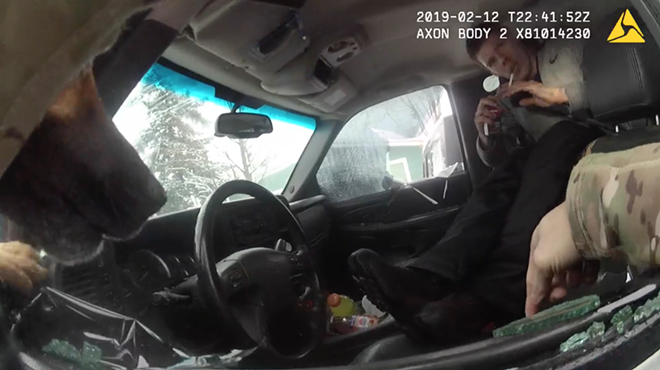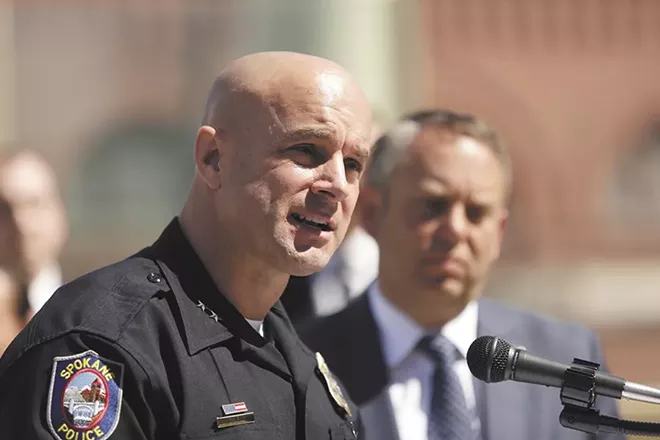
Graphic video released by the Spokane Police Department depicting a violent and controversial arrest — officers threatened to "f—-ing kill" a suspect and hoisted a canine into a car cabin where it attacked the suspect — has elicited intense criticisms of the officers' conduct. Meanwhile, newly released police records also show that several supervisory officers viewed the use of the police dog as problematic.
"It was disturbing and violent, which surprised me because it seemed like the person was being compliant and saying he would come out," says Spokane City Councilman Breean Beggs. "The language and the threats to kill were totally inappropriate."
In a statement, Camerina Zorrozua, a staff attorney at the nonprofit Center for Justice, slammed the department over incident, specifically calling out Dan Lesser, the officer who shouted threats like "I'm going to put a bullet in your brain" and deployed the canine.
"The Center for Justice is appalled by Officer Lesser's actions, language, and behavior displayed in the recently released video. We are deeply concerned that any community trust in the SPD has been further eroded," she writes. "Officer Lesser seems to have taken no opportunity to de-escalate the situation with [the suspect] Lucas Ellerman."
Council president and mayoral candidate Ben Stuckart tells the Inlander that Lesser's demeanor in the video constituted "unacceptable behavior."
"I’ve watched it twice now. I thought he was coming out when he sent the dog in," he adds.
Others appeared to endorse the use of the canine during the arrest, supporting the view of the department brass. (At a Wednesday press conference where the footage was presented to reporters, Spokane Police Capt. Tom Hendren stated that the department's internal investigation found no use-of-force policy violations.)
"We have to balance police effectiveness with police professionalism," mayoral candidate Nadine Woodward says in a statement provided to the Inlander. "The officers had the first but lacked the second, a fact which I'll work to correct when I'm mayor." Woodward has been endorsed by the Spokane Police Guild.
"I think it’s a little troubling," Cindy Wendle, a candidate for Spokane City Council President, tells the Inlander. "The language, first of all, is not becoming of an officer."
Spokane Mayor David Condon, meanwhile, issued a statement shortly after the police department released the video, criticizing the language used by one of the officers in the footage.
"While this incident removed a highly dangerous individual from our streets, the demeanor and disturbing language used by the officer in this incident demonstrates that we must continue to hold our officers accountable to the highest standards of conduct," Condon says.
Newly revealed records also show that some within the Police Department thought that the use of the canine was inappropriate — contrasting with department command staff's ruling that the action was justified. In the weeks following the arrest, which occurred on Feb. 12, two supervisory officers characterized use of the canine as problematic, according to documents obtained by the Inlander through a public records request.
In a report dated Feb. 12, Sgt. Sean Wheeler writes that while it may have been "reasonable" for Dan Lesser to believe that Ellerman posed a threat, his report and body camera footage "show that at the time of the application of force, the suspect's threat of violence was not imminent." Wheeler ultimately found Lesser's use of the canine "out of compliance with policy."
Similarly, Lt. Rob Boothe states in a March 8 report: "It is my belief that the suspect posed a potential threat of violence or serious bodily harm, but that threat was not imminent at the time of the application of the canine."
"I further agree with Sergeant Wheeler's assessment that the deployment of the canine and subsequent use of force was out of compliance with policy," he adds.
While Dan Lesser was cited for improper demeanor and not activating his body camera quicker, department command staff ruled that the force used in the incident, including the use of the canine, was justified.
Spokane Police Sgt. Terry Preuninger, a spokesman for the department, says that differences in opinion during chain-of-command reviews on uses of force are common.
"When you’re looking at an event like this, as large as it is, there’s no way that four different police officers within the chain of command review are going to agree 100 percent," he says. "I wouldn’t say they were overruled."
Spokane Police Ombudsman Bart Logue praised Wheeler and Boothe who characterized Lesser's use of the canine during the incident as out of policy.
"It’s hard to step out from the crowd," he tells the Inlander. "I commend those supervisors a lot."
At Wednesday's press conference where the video was screened for reporters, Police Chief Meidl and Hendren, the captain, stressed that the officers were acting in a high-stress situation under the assumption that Ellerman was armed and dangerous.
"Using the canine to get [Ellerman] into custody, to remove him from the vehicle, was certainly, for the officers, the safest thing to do to get him out of that vehicle at the time," Meidl said. "There was every reason to believe that this person did have a gun before he was handcuffed and searched."
Hendren pointed to the language that Dan Lesser used during the arrest — he was cited for demeanor, though Meidl wouldn't tell reporters then what consequences he would face — as the most problematic aspect of the video.
"This video is shocking in the sense that the language is extremely harsh," he said.
"It was not to our standards," Meidl said. "It was alarming."
However, Hendren also denied that Lesser's vulgar threats to kill Ellerman were forms of intimidation: "He wasn't doing this with the intent to intimidate or harass," he said. "He was doing this with the intent to de-escalate and not have this subject provoke him into deploying deadly force."
Meidl said at the press conference that Dan Lesser has been assigned to a "plain clothes detail" working on investigations.
The arrest started with a traffic stop on a white truck on Feb. 12, 2019. Spokane police officers were looking for a 29-year-old suspect, Lucas Ellerman, who was wanted on several felony warrants, including unlawful possession of a firearm. (The officers had also received a tip that Ellerman was armed with a pistol, according to police reports.) Ellerman had been hiding in the truck when it was pulled over, and after officers detained the driver, he jumped behind the wheel and drove off, prompting a car chase. The two pursuing officers, Dan and Scott Lesser — they're related — eventually pinned the truck at a snowbank in Spokane Valley.
Per the body camera footage, Dan Lesser smashes the driver's side window of the truck, and starts shouting threats at Ellerman, including "I'm going to f****ing kill you" and "you're going to get bit by a f***ing dog." He then shouts "gun" several times while Ellerman pulls out a pack of cigarettes and a lighter and lights up. He tells Dan "I've got a pistol" twice. Scott promptly smashes the passenger side window and Ellerman retreats to the back seat, while Dan tells Scott to get his dog.
While Scott is fetching the canine, Dan says, "You're going to get bit right now. Get the f*** out here" and "I'm going to put a bullet in your brain." Ellerman then begins moving towards the driver's seat, stating "I'm coming" multiple times. The officers then push the dog into the car with Ellerman, as he says, "I don't have a gun," to which Dan responds: "f—- you." Screaming ensues as Ellerman is mauled by the dog. Eventually, the officers pull him out of the vehicle with the dog still biting his leg.
No firearm was recovered from the vehicle. Back in May, Ellerman's sister told the Inlander that her brother, who is now serving a sentence in state prison, is still receiving treatment for an infection that stemmed from the canine attack.
In his police report, Dan Lesser states that Ellerman was "looking for a way to escape and feigning cooperation" before he deployed the canine. He adds that he was concerned that Ellerman had a pistol and there was no safe way to enter the truck because it was pinned.
"I still could not see anything behind the front seats where Ellerman was at," Lesser writes. "There were numerous locations where a gun or any other type of weapon could be hidden or just lying on the backseat and I would not be able to see it."
We've embedded the footage from the body cameras of both Dan and Scott Lesser below.
The arrest and the associated video footage has been the subject of controversy for months. As first reported by the Inlander, information about the video was leaked to a local blogger and former police officer, Brian Breen, who then informed Spokane Police Ombudsman Bart Logue, who previously hadn't been notified of the incident. Logue, disturbed by the footage, filed a complaint in May, prompting an internal-affairs investigation into the incident.
In response, Meidl has argued that the department was already conducting a chain-of-command review of the incident before Logue filed the complaint.
"The demeanor, absolutely, that is outside policy, and the failure to activate the body camera as required by policy, those were already identified as outside policy," Meidl said at the Wednesday press conference. "They were about to be addressed when we then received a formal complaint through the ombudsman's office."
Logue also argues that the department should have immediately referred the case to internal affairs once supervisors had filed their reports finding policy violations. At the time, policy required that supervisors "initiate" an internal-affairs investigation by filing a complaint whenever any allegations, complaints, or concerns about possible use-of-force violations arose.
"Potential cases of misuse of force need to be investigated properly for a disciplinary finding," he says.
Logue also criticized the department in October for changing its internal policy governing how use-of-force cases get referred to internal affairs. Now, supervisors aren't explicitly required to report potential use-of-force violations to internal affairs as complaints — which would prompt an investigation. Instead, the new policy requires that supervisors file reports that go up the chain-of-command and that they report any "egregious" conduct to their superior.
In an Oct. 15 letter to Meidl, Logue states that the policy change exacerbates his concerns about "interviews taking place off the record, improper investigations, and special treatment; as well as an absolute removal of an oversight mechanism."
Meidl has pushed back on the argument that the policy change undermines oversight, arguing that language requiring that officers report policy violations to their superior serves as a catch-all for investigating potential misconduct. The police chief has also pointed to the fact that the ombudsman is invited to monthly meetings of the department's use-of-force review board as another way that Logue is informed of such cases.
Stuckart argues that there's too much discretion allowing incidents like the Ellerman arrest to avoid proper scrutiny.
"You can't have these type of things buried [with] no oversight at all," he says. "If not for what I would call a whistleblower inside the police department, we would never have known about the existence of this. That's unacceptable."
"Otto Zehm's legacy continues to be forgotten as SPD's protectionist culture shows it is not willing to be held accountable by the public," Zorrozua, the staff attorney at the Center for Justice, writes in her statement. "The community demands a police leader who is not afraid to make unpopular decisions necessary to protect the public from police abuses."

